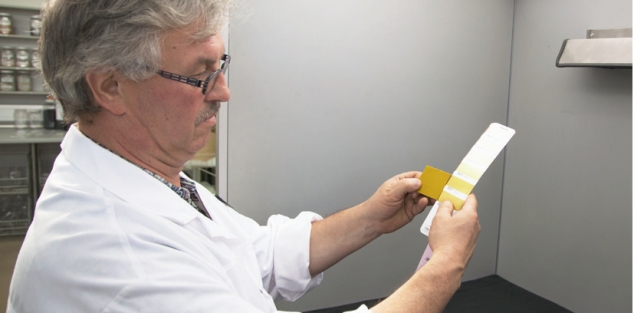The Application Engineer
The all-rounders in masterbatch operation are the application engineers. They mediate between the customer requirements and the developers. The tools of their trade are comprehensive knowledge of current applications, available additives and colourants and the latest processing techniques, coupled with professional project management.
The job
The demands plastic processors place upon the suppliers of masterbatches are numerous. The application engineer comes into play when the situation is challenging. A masterbatch in a certain blue tone for a canister? Not a problem for the sales representative or colourist. Can the canister be exposed to the Australian sun for many years and still be used to safely contain motor oil? This is more difficult. The application engineer asks questions and gathers information about the processing technique and wall thickness. Then they make a recommendation: base polymer, amount of UV stabilizer, suitable pigments, etc.
The application technician often accompanies the sales representative when visiting customers in support of a project. If a compounder of colour pigment powders intends to switch to masterbatches, for example, then they will definitely need the advice of the application engineer. Sales representatives, application engineers and development managers cooperate to develop a joint solution proposal for larger projects.

Is the colour tone correct? In the case of customer projects, the application engineer accompanies the colourist until the customer is satisfied.
The skills
You can never learn everything! If this applies to any professional group, then it is certainly the application engineer. They must always be up-to-date with current developments. Application engineers must also use their contact with suppliers to keep abreast of the latest raw materials, such as functional additives. They learn about the processes that plastic processors employ. The constantly changing colour portfolio of masterbatch manufacturers demands a special competence; new colour effects combined with different rules for their application in numerous areas are always coming to the market. The application engineer must always keep up with developments. This not only enables them to competently advise their customers, but also provides an impetus for the direction of their own company. If, for example, an increasing number of customers want to use a laser to label or weld their plastic products, the application engineer knows what additives are necessary. They know whether modern techniques such as 3D printing will become significant and must learn what the raw materials mean for the mix.
Application engineers must have a solid foundation for applying this new knowledge. The application engineer should be proficient in chemistry, physics and have a good understanding of technical processes. They must also have a knack for business – after all, they must not only assess whether a customer’s request is feasible, but also at what price. Good English skills are also required for working with international customers.
The training
Any search for an “application engineer” training programme with a special focus on masterbatches would be in vain. After all, it is about combining the possibilities of your company with the desires of the customer. A degree in plastics engineering is likely a good basis for someone wishing to pursue a career in application engineering for masterbatch production. After all, it is essential to acquire experience and possess detailed knowledge about the products and potentials of your own company. In many masterbatch companies, the path is open to process mechanics and experienced colourists willing to pursue further training. A state-certified technician for plastics technology and fibre composite technology is not only knowledgeable about methods of plastic processing, such as injection moulding and extrusion technology, but also the basics of control technology and, of course, polymer chemistry and materials. This sort of background combined with project management competencies is the perfect foundation for successfully working as an application engineer in masterbatch operations.

In short
The application engineer has an important function as the interface between the company and customers.

Can a tricky customer request be implemented? An obvious job for the application engineer.

Chemistry and physics: essential for a career as a masterbatch application engineer.

Customer and trade fair visits, also international, are part of the job.


